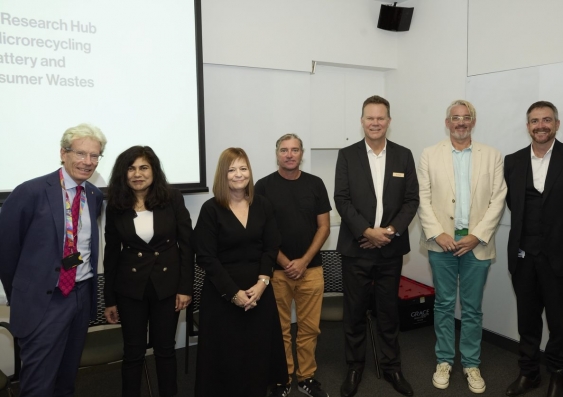ARC Microrecycling Research Hub opens at ╣·▓·¥½ãÀ Sydney
A new research hub for microrecycling has opened at ╣·▓·¥½ãÀ Sydney today.
A new research hub for microrecycling has opened at ╣·▓·¥½ãÀ Sydney today.

Stuart Snell
╣·▓·¥½ãÀ External Communications
0416 650 906
s.snell@unsw.edu.au
The ARC Research Hub for Microrecycling of Battery and Consumer Wastes, directed by renowned ╣·▓·¥½ãÀ Scientia Professor Veena Sahajwalla, was opened today.
The is a five-year national program of cutting-edge research to develop innovative technologies to recover the valuable materials contained in AustraliaÔÇÖs battery and other complex wastes not currently subject to conventional or widespread recycling.
The Hub, hosted by the ╣·▓·¥½ãÀ Sustainable Materials Research and Technology (SMaRT) Centre, is a collaboration with numerous industry partners and researchers from six other universities around Australia: University of Technology, Sydney; University of Sydney; Monash University; University of Wollongong; Queensland University of Technology; and Deakin University.
The Australian Research Council (ARC) Chief Executive Officer (CEO) Ms Judi Zielke PSM said that with more than a quarter of the 76 million tonnes of solid waste Australia generates each year going to landfill, the innovative work of the Microrecycling Research Hub is critical in identifying new ways to recycle waste and helping us move towards a circular economy.
ÔÇ£The HubÔÇÖs vision of translating science into real world environmental and economic benefits is at the heart of the ARCÔÇÖs purpose to harness expertise to support the advancement of knowledge and innovation for the benefit of Australia,ÔÇØ said Ms Zielke.
╣·▓·¥½ãÀ Vice-Chancellor and President Professor Attila Brungs said the Microrecycling Hub aims to boost resource recovery capability by creating new advanced and scalable manufacturing technologies, based on SMaRTÔÇÖs┬á concept.
ÔÇ£It is vital that we recover and reuse materials from complex batteries and other consumer wastes in manufacturing as we strive to decarbonise and build the electrification infrastructure needed for our renewable energy supplies.ÔÇØ
It is estimated that 18,600┬átonnes of batteries ÔÇô all of which are hazardous to some degrees ÔÇô are discarded to landfill in Australia annually. Yet batteries are essential as the world transitions to renewable energy and Australia aims to achieve net zero emissions by 2050.
The federal released in February 2023 found that battery firming capacity is needed for the National Electricity Market to increase its use of renewables to 82 per cent by 2030. It says demand for batteries is forecast to accelerate as much as tenfold over the next decade, which is more than solar photovoltaics grew over the past decade.
Prof. Sahajwalla┬ásaid the Hub is developing microrecycling science to develop innovative solutions to obtain from waste batteries and consumer waste the valuable materials they contain so that the HubÔÇÖs end user partners can use these materials for different applications.
ÔÇ£The science of microrecycling, in collaboration with industry partners, will lead to the creation of new pathways so waste materials can go from being low value to high value materials which can be used in manufacturing,ÔÇØ she said.
ÔÇ£We are transforming those materials via thermal and other processes into high value materials and products via the advanced manufacturing techniques being developed in the Hub.
ÔÇ£The broader impact of the Hub will go beyond scientifically developed recycling solutions. Climate change and clean energy narratives often overlook the need for more sustainable manufacturing and waste management practices where we start to use waste resources for future manufacturing supply chains.ÔÇØ
╣·▓·¥½ãÀ Deputy Vice Chancellor, Research and Enterprise, Professor Nicholas Fisk said while this $3.3 million Hub builds on previous waste and recycling breakthroughs developed by SMaRT, it is now forging new processes in partnership with committed industry partners so that technologies developed are commercially fit for purpose.
ÔÇ£╣·▓·¥½ãÀ has a strong track record of translating scientific discoveries into real-world application in collaboration with industry and government partners. The Microrecycling Hub focusses on recovering valuable materials from spent batteries and other wastes to create national materials sustainability and sovereign capability and accelerate efforts to reduce emissions and decarbonise.ÔÇØ
While the Hub was begun during COVID lockdown periods, it is now being launched as significant progress is being made on its research and development program, with a total of 13 scientific papers published in leading journals so far, eight of which were published in 2022 alone.
These papers are for the goal of using wastes as a sustainable resource for future manufacturing needs.